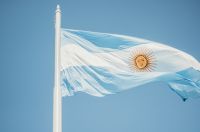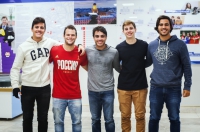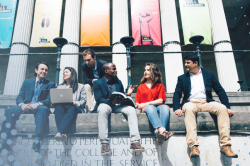The Nanyang Technological University is one of the two major universities of Singapore. It regularly holds leading positions in global university rankings. It is ranked 11th in the QS World University Rankings 2018; since 2014, QS recognizes it as one of the world’s top young universities. NTU is split into four colleges which are, in turn, separated into 12 schools. Half of these schools focus on technological research and belong to the College of Engineering, known around the world for its experts.
The university is also famous for its infrastructure. The Yunnan Garden campus takes up an area of 200 ha on the south-west of the island. This is the largest campus in Singapore, with 16 dormitories for students and two Graduate Halls. NTU also served as an Olympic Village for the first Youth Olympics in 2010.
In its development, NTU gives top priority to the creation of new scientific structures in partnership with leading international universities and research centers. In the past decade, they have worked with Imperial College London (UK) on the creation of a medical school, with ETH Zürich (Switzerland) on the development of a research center for urban sustainability and with the Fraunhofer Society (Germany) on the Fraunhof Singapore research center.

NTU's New Learning Hub. Credit: arch-shop.ru
ITMO University is developing in a similar way by creating such institutions as the Institute of Translational Medicine and the Institute of Cyber Technologies for Financial Systems, which are part of the School of Translational Information Technologies. Research and collaboration are taken to a global level through founding of International Laboratories and attracting experts from all around the world through the ITMO Fellowship and Visiting Professorship programs.
For instance, in 2013 ITMO University founded the ICT Center TROIKA (Technology and Research on Information-Driven Knowledge Alliance), among the members of which are numerous foreign universities, with ITMO University and the University of Amsterdam (UvA) at the helm. For several years, the university has worked closely with a professor of UvA and NTU Peter Sloot. In one instance, a research project on distributed emergency computations for decision support in critical situations was completed, led by Prof. Sloot and Alexander Boukhanovsky, head of ITMO’s eScience Research Senter and the School of Translational Information Technologies.
ITMO University’s Vice Rector for International Relations Daria Kozlova notes that the next step in developing the relationship between the two universities will be the creation of joint international educational programs.

Daria Kozlova (center)
“ITMO University and the Nanyang Technological University are already working together on research on informational technologies. We see a lot of potential in our collaboration with Singapore’s largest and one of the world’s top universities. In the future, we intend to work towards the development of joint? educational programs and student mobility. We plan to agree on the organization of summer schools and short-term internships by the summer of next year,” – comments Ms. Kozlova.
To discuss their future plans on the joint development of educational programs, representatives of Nanyang Technological University arrived to ITMO University on August 1. The Singaporean university was represented by Prof. Lalit Kumar Goel, head of NTU’s Office of Global Education & Mobility and Kate Ang, the Office’s manager.
During the meeting, Alexander Boukhanovsky demonstrated to the guests the results of several key research projects. He spoke, in particular, about the project conducted in May of 2016 by an international research team which included scientists from ITMO University. The research entailed a series of experiments on the site of one of the world’s largest festivals, the Kumbh Mela at Ujjain, India. The research team used the data they gathered to develop technologies, mathematical models, methods and algorithms that will help provide complex security at global mass events.

Prof. Boukhanovsky also presented other projects developed by the eScience Research Institute, such as the Interactive Atlas of the General Human Anatomy, which can be used to visualize the results of predictive modeling for various physiological processes in the human body, as well as projects related to network activity monitoring.
As Prof. Goel noted after the meeting, working together in the areas of predictive modeling, Big Data analysis and translational medicine can serve as a foundation for further close collaboration between the universities. NTU is also interested in organizing joint summer schools and internships in the near future.

Lalit Kumar Goel
“When choosing partners, we always focus on the universities for which research is a priority. ITMO is one such university. Our collaboration with ITMO University holds a lot of promise, as it is one of Russia’s top universities. Besides, our two universities have already met on various occasions and are familiar with each other's strengths. For this reason, I think that it will be easy for us to continue our collaboration not just in the field of research, but in development of academic mobility programs, as well. We’re interested in conducting summer schools and developing short-term programs in the near future,” – said Prof. Goel.
He added that NTU is ready to send its students to ITMO University’s summer schools in June or July of next year. In addition, the Nanyang Technological University will also be interested in the development of long-term programs.








